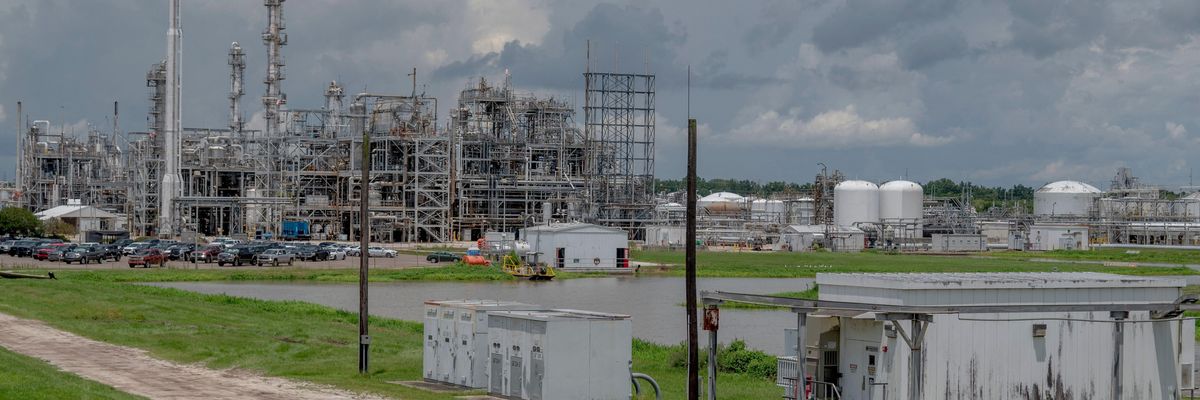A pair of local advocacy groups in St. John the Baptist Parish, Louisiana, submitted a civil rights complaint to the U.S. EPA on Thursday, accusing two state agencies of failing to protect residents of the low-income and predominantly Black jurisdiction from toxic air.
"We're asking the EPA to step in to protect our civil rights."
According to the complaint--filed by Earthjustice and the Lawyers' Committee for Civil Rights Under Law on behalf of Concerned Citizens of St. John (CCSJ) and the Sierra Club--the Louisiana Department of Environmental Quality (LDEQ) and the Louisiana Department of Health (LDH) have violated Title VI of the Civil Rights Act of 1964, which prohibits entities receiving federal financial assistance from engaging in activities that subject individuals to discrimination on the basis of race, color, or national origin.
LDEQ and LDH have violated that prohibition, the complaint says, because their regulatory failures have subjected residents of St. John the Baptist Parish, a majority Black parish, to disproportionate air pollution and related harms.
"Environmental injustice in St. John the Baptist Parish has created a public health emergency," Earthjustice attorney Deena Tumeh said in a statement. "This predominantly Black community suffers disproportionate exposure to toxic air pollution and, as a result, the highest cancer risk from air pollution in the nation. EPA must protect the civil rights of St. John's Black residents and ensure that federal funds are not used to discriminate on the basis of race."
Mary Hampton of CCSJ said that "we have tried to engage with state agencies and local officials to share our concerns about our communities' ongoing exposure to toxic air pollution and the extraordinarily high rates of cancer we experience. But we have been dismissed time and again."
"It is unacceptable that we've been ignored for so long," said Hampton, "and so now we're asking the EPA to step in to protect our civil rights, including to have equal protection from environmental harm, and to ensure that our right to breathe clean air is finally enforced."
Located in the heart of Cancer Alley--an 85-mile corridor between Baton Rouge and New Orleans that has long been dominated by the petrochemical industry--St. John the Baptist Parish is home to numerous factories that spew ethylene oxide, as well as the Denka Performance Elastomer neoprene production plant, a potent source of chloroprene.
The EPA inspector general called for stricter limits on chloroprene and ethylene oxide emissions in May after CCSJ submitted a petition to the federal agency for emergency action and rulemaking pursuant to the Clean Air Act.
But Denka--a Tokyo-based corporation that purchased the neoprene manufacturing complex from U.S. chemical giant DuPont in 2015--"says the EPA should reconsider its listing of chloroprene as a likely human carcinogen based on a company-sponsored study that concluded the chemical was much less cancer-causing than the EPA found," Nola.com reported last year.
Also in May, CCSJ took its fight against environmental injustice abroad, filing an emergency request for precautionary measures at the Inter-American Commission on Human Rights in an attempt to protect St. John residents from further harm.
The new civil rights complaint says that LDEQ has failed to: 1) review the permit renewal applications submitted by Denka and determine whether to renew or strengthen those permits; 2) conduct the public notice and comment process required by Louisiana and federal law for permit renewal applications; and 3) control hazardous air pollution from Denka and other sources as needed to protect St. John residents from disproportionate, adverse impacts.
LDH, meanwhile, has allegedly failed to: 1) provide the public with necessary information on the health threats of air pollution from Denka and nearby sources; and 2) make necessary recommendations to all relevant government agencies and communities on ways to reduce and prevent exposure to hazardous chemicals from these sources.
The complaint adds that both agencies have failed to fulfill the terms of an EPA grant awarded to determine if Denka's hazardous air pollutant emissions have caused higher instances of cancer in St. John the Baptist Parish.
EPA Administrator Michael Regan recently visited the parish during his "Journey to Justice" last fall.
Dorian Spence, director of the Special Litigation and Advocacy Project at the Lawyers' Committee for Civil Rights Under Law, said Thursday that "it is beyond time for the EPA to step in to protect the residents of St. John the Baptist Parish from environmental racism."
"The Louisiana Department of Health and the Louisiana Department of Environmental Quality have abandoned their duty to protect this majority Black community," Spence added. "Intervention from the EPA is critical to protect the health and wellness of the residents of St. John."
Jane Williams, chair of the Sierra Club's National Clean Air Team, echoed that message.
"The U.S. Environmental Protection Agency must step in and protect the residents of St. John the Baptist Parish," said Williams. "Louisiana has failed to protect fenceline communities, including St. John residents, from the harms of highly polluting facilities. Now is the time to act."

